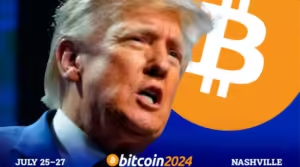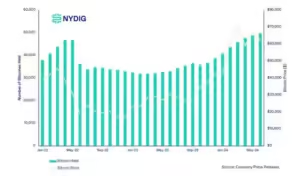U.S. Spot Bitcoin ETFs Set Record 18-Day Streak of Net Inflows

Quicktake
- U.S. spot bitcoin ETFs have achieved 18 consecutive days of net inflows.
- On Thursday, the 11 ETFs recorded a total net inflow of $217.78 million.
- BlackRock’s IBIT led the inflows, with $350 million added, while Ark Invest’s ARKB saw significant outflows.
U.S. Spot Bitcoin ETFs Set Record 18-Day Streak of Net Inflows
In an unprecedented run, U.S. spot bitcoin exchange-traded funds (ETFs) have now recorded net inflows for 18 straight days, the longest streak since their inception. This continuous influx of capital highlights growing investor interest and confidence in bitcoin-based financial products.
On Thursday alone, the 11 U.S. spot bitcoin ETFs witnessed a combined net inflow of $217.78 million. Leading the pack was BlackRock’s IBIT, which drew in an impressive $350 million in net inflows, solidifying its position as the largest spot bitcoin ETF by net assets. The data, provided by SoSoValue, underscores the substantial lead BlackRock holds in the market.
Other notable players in the space also experienced positive movements, albeit on a smaller scale compared to BlackRock. Fidelity’s and VanEck’s bitcoin ETFs reported net inflows, reflecting continued interest in these funds. However, not all ETFs shared in the positive momentum. Ark Invest’s ARKB ETF recorded significant net outflows of $96.6 million, one of the largest exits among the ETFs. Similarly, Grayscale’s converted GBTC saw net outflows of $37.5 million, and Bitwise’s BITB ETF experienced a net outflow of $3 million. Meanwhile, five other spot bitcoin ETFs, including Invesco’s BTCO, reported no activity on Thursday, showing neither inflows nor outflows.
This record-breaking streak of net inflows has pushed the cumulative total to $15.56 billion since the ETFs’ launch in January. The inflows mark a recovery from the stagnation observed in April and May, although they remain below the peak levels seen in March. The Block’s data dashboard provides a comprehensive overview of these trends, highlighting the fluctuating yet overall positive trajectory of investment in bitcoin ETFs.
The influx of capital into these ETFs is a clear indication of the increasing mainstream acceptance of bitcoin as a viable investment asset. The growing popularity of these funds is partly attributed to the perceived stability and regulatory oversight they offer compared to direct investment in cryptocurrencies. ETFs allow investors to gain exposure to bitcoin without the need to manage the underlying asset directly, which can involve complexities such as secure storage and transaction management.
BlackRock’s dominance in the market, evidenced by the substantial inflows into its IBIT ETF, is a reflection of its strong brand and investor trust. BlackRock’s aggressive push into the bitcoin ETF space has paid off, positioning it well ahead of its competitors. The firm’s success could encourage other major financial institutions to enhance their offerings, potentially increasing competition and innovation in the space.
Fidelity and VanEck, while not matching BlackRock’s numbers, continue to attract steady interest. Their presence in the market is crucial for providing investors with diverse options, catering to different investment strategies and risk appetites. The competition among these firms is likely to drive better services and possibly lower fees for investors, making bitcoin ETFs an even more attractive investment vehicle.
On the other end of the spectrum, the significant outflows from Ark Invest’s ARKB and Grayscale’s GBTC suggest that not all funds are benefiting equally from the current market dynamics. These outflows could be attributed to various factors, including investor reallocation of assets, performance concerns, or strategic shifts. The disparity in fund performance highlights the importance of thorough research and due diligence by investors when selecting ETFs.
The resurgence of net inflows after a period of stagnation indicates renewed confidence among investors. This resurgence could be linked to several macroeconomic factors, including regulatory developments, market sentiment towards bitcoin, and broader trends in the financial markets. The upcoming U.S. Federal Reserve meetings, economic data releases, and global financial conditions will likely continue to influence investor behavior and the performance of bitcoin ETFs.
In conclusion, the record-breaking streak of net inflows into U.S. spot bitcoin ETFs underscores a significant milestone for the industry. The continued investment reflects growing mainstream acceptance and confidence in bitcoin as a viable investment asset. As BlackRock and other major players lead the charge, the landscape of bitcoin ETFs is poised for further growth and evolution. Investors should stay informed about market trends and regulatory developments to navigate this dynamic and promising sector effectively.
4o



